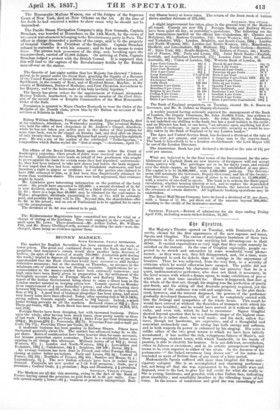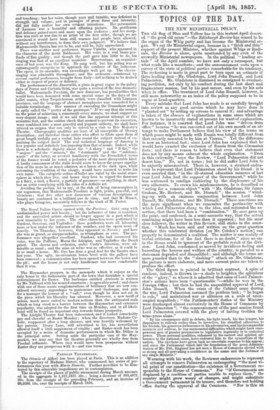tOr tOtatres.
Her Majesty's Theatre opened on Tuesday-, with Donizetti's La Favorita, chosen for the first appearance of the now soprano and tenor,
Spezia and Giuglini. The excess of anticipatory laudation of these two
performers in the newspapers was anything but advantageous to their debut. It excited expectations so very high that they could scarcely be satisfied on the instant. In the case of Giuglini especially, people expected to be struck and astounded by some wonderful vocal phenomenon: as they were not, they felt disappointed, and, for a time, were more disposed to seek for defects than to indulge in the enjoyment of beauties. Thus he was subjected, from the very first, to a severity of criticism which he would otherwise have escaped. The public did not immediately understand his character-did not perceive that he is a quiet, undemonstrative performer, who does not think it necessary, in the level scenes with which a drama opens, to make exhibitions of pou or which are at that time uncalled for. Hence it happened, that duri..g the whole of the first act, though his singing was the perfection of purity and finish, and his acting all that dramatic propriety required, yet the demeanour of the audience was cold and suspicious. As the plot thickened, however, and the interest deepened, the powers of the performer gradually developed themselves, till at lust he completely carried with him the feelings and sympathies of the whole house. This result ho would have arrived at without the flourishes of trumpets with which his advent was heralded ; and he would have arrived at it without the difficulty, and even risk, which he had to encounter. Signor Giueini showed beyond question that he is a dramatic singer of the highest class. In figure he is rather short, but well made ; and his dark, sallow features, though not handsome, are expressive, and of a thoughtful and somewhat melancholy cast. His acting has both energy and softness, and in both respects its power is enhanced by his singing. His voice is unlike either of the two great tenors to which we have been latterly accustomed ; it has neither the rich, voluptuous fulness of Mario's, nor those piercing, strident tones, with which Tamberlik, in his bursts of passion, is able to electrify his hearers, It is not deficient, nevertheless, either in fulness or sweetness; and in its artistic management Giuglini seems to be even superior to either of his rivals. In the fineness of his portamento-" the linked sweetness long drawn out" of his notes-he reminded us more of Rubini than of any tenor of a later period. Mademoiselle Spezia suffered still more than Giuglim did from anticipatory eulogies. She is an accomplished and charming performer ; but, not being all that she was represented to be, the public were not disposed, even to the last, to give her full credit for what she really is. She is young, handsome, and graceful, with a fine Italian face, indicating great sensibility ; and sensibility breathes in the vibrating tones of her voice. In the scenes of tenderness and grief she was exceedingly soft and touching ; but her voice, though pure and tunable, was deficient in strength and volume, and in passages of great force and intensity, did not fully realize her own evident intentions. Her personation of Leonora was a beautiful and affecting picture. Its gentleness and delicacy gained more and more upon the audience ; and her reception was such as was due to an artist of the first order, though we are convinced it would have been still. warmer had people been allowed, without any interference, to form their own judgment. We believe that Mademoiselle Spezia has yet to be, and will be, fully appreciated. There was another new performer, Signor Visions, who appeared in the character of the monk Baldassare. His voice is a real basso profondo of fine quality ; and though the part gave him little to do, his singing was that of an excellent musician. Beneventano, an acquaintance of last year, was the King. He sang well, but his acting was so extravagantly energetic as to approach the confines of the ludicrous. The opera, in its ensemble, was exceedingly Well got up. The chorussinging was admirable throughout ; and the orchestra—reinforced by several capital performers, brought from Italy—left nothing to be desired either in respect of power or delicacy. The performance of the Esmeralda, a piece in great vogue in the palmy flays of Perrot and Carlotta Grisi, was quite a revival of the true dramatic ballet. Mademoiselle Poechini, the new danseuse, has peculiarities that would have been honoured with sonic special name in the days of the ballet mania, when Terpsichorean artists were classified with Linnrean precision and the language of abstract metaphysics was ransacked for a suitable ierminology. Her manner of executing the Truandaise might be aptly called the "poetry of the grotesque." If we say that she seemed on the point of achieving a somersault every minute, we shall suggest no very elegant image ; and if we add that the apparent attempt at this eccentric feat, and the sudden check that seemed to prevent its execution, were combined into a most graceful and piquant entirety, we shall have uttered an enigma that can only be solved by a visit to Her Majesty's Theatre. Choregraphic qualities are least of all susceptible of literary description ; and therefore those critics who affect to dilate upon them at groat length artfully put a verbal halo round the subject instead of examining the subject itself. The real technical language of dancing is less popular and Infinitely leas imposing than that of music. Indeed, while there is a scholastic dignity about the "A sharp S' and "B flat," the "majors" and the "minors," the "dominants" and the "subdominants" of the latter, an avowed familiarity with the Frenehifled terms of the former would be voted a pedantry of the most disreputable kind. A lordly connoisseur of the stalls would scorn to know the proper appellation of the steps he so much admires, as a baron of the dark ages, while esteeming the erudition of the clergy, would have scorned to write his own name. 'The eulogistic critics of ballet are ruled by the social atmosphere in which they live, and hence they love to regard the danseuse as a fairy, a bird, a flower, a particle of gossamer—as anything, in short, but an artist complying with the rules of a definite art.
Avoiding the poetics, let us say, at the risk of being commonplace in our vagueness, that Mademoiselle Pocohini is light, petite, graceful, and vivacious ; that five other new danseuses of various descriptions of beauty aro combined in a brilliant pas de cinq ; and that M. Massot, who plays Gringoire, accurately follows in the track of M. Perrot.
The Royal Italian Opera opened with the Puritan 1. Grisi sang with undiminished power and beauty ; but the influence of time is resistless, and the unrivalled artiste should no longer appear in a part which is now unsuitable to her years. The other characters were performed by Gardoni' Graziani, and Tagliaflco : these gentlemen were all labouring more or less under the influence of the weather, and the opera went off heavily. On Thursday, however, Grisi appeared in Norma ; and here she was as grand, as unapproachable, as triumphant as ever. The performance was altogether excellent. Gardoni, who had recovered his voice, was the Pollione, Moral the Adalgisa, and Tagliefico the Druid priest. The chorus and orchestra, under Costa's direction, were admirable as usual ; and the mise en scene was as effective as it could be in so small a house. Mr. Gye has done a good deal for the theatre since last year. The ugly, inconvenient boxes level with the gallery have been removed ; a communication has been opened between the boxes and the pit ; and the house is not only handsomer but more comfortable than it was.
The Haymarket prospers in the monopoly which it enjoys as the only house in the fashionable part of the town that furnishes a special entertainment for Easter. The burlesque entitled Atalanta is written by Mr. Talfourd with his wonted smartness ; is agreeably acted ; and closes with one of those scenic conglomerations of brilliancy that are now considered necessary appendages to pantomime and burlesque, and gain for a manager the honour of a "call," even though he does not act in the piece which his liberality has adorned. Moreover, a new tariff of prices, much more suited to modern notions than the antiquated scale which so long stood as a barrier between the Haymarket and extensive popularity, was adopted for the first time on Monday, and in all likelihood will be found an important step towards future prosperity. The Adelphi Theatre had been redecorated, and it looked remarkably gay and cheerful on Easter Monday ; when the directress, Madame Celeste, reappeared after a long absence, and was heartily welcomed by her patrons. Drury Lane, still advertised to let, has nevertheless allowed itself a little supplement of vitality ; and Easter-week has been occupied by a series of dramatic performances in which Mr. Dillon is the principal actor. Setting aside the particular case of the Haymarket, we may say that the theatres generally are wholly free from Paschal influence. Where they would have been prosperous without Easter they are prosperous with it—and vice versa.



























 Previous page
Previous page